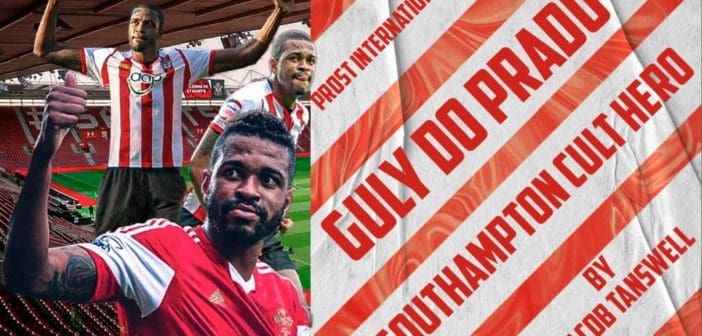Cult heroes at football clubs tend to be players who hold a distinct enigma, or characters that seem to be perennially shrouded in mystique.
For Southampton Football Club, no one quite encapsulates the cult status more than Guilherme Do Prado Raymundo – A.K.A Guly Do Prado.
An integral part of the Saints’ side that would achieve back-to-back promotions and end up immortalising their names into club folklore, Do Prado made 118 appearances during his four-year stay, scoring 23 goals.
But facts and stats do not tell the full story, nor to the overarching sense of sweet nostalgia when supporters hear his name. This is the man that, despite his jarring flaws and somewhat substandard goal record, departed the club with a video tribute made for him – surely the most apt gesture of a cult hero bidding a fond farewell.
Every football club has its fabled cult heroes. It may be for some unknown reason or a set of intangibles, but these players always seem to live long in supporters memories. They might earn their own nicknames, inherit a range of merchandise or regularly pop-up in pub quizzes.
Most of the time, they aren’t actually that good. That’s probably one of the reasons why some resonate on such a profound level with so many people. They often carry a distinct trait, whether that is an oblong shaped haircut or a running style that is so peculiarly awkward it defies all running mechanics.
Unpredictable but never straight-forward, whether that their performances on the pitch or their personality off it, they continue to be talked about long after they’ve gone.
“I remember Alan Pardew, when Guly turned up at the football club,” says former team-mate Ryan Dickson. “Pards was like ‘oh god, I’ve got to play this guy’ and he obviously wasn’t his player, he was (Nicola) Cortese’s. He was just the loveliest, chilled out man ever. Just an all round cool dude and we soon found out he could kick the ball a bit, too.”
From those Prost International spoke to, the overall opinion of Do Prado was one of unanimous praise and warmth. The classic Brazilian footballer who was every bit the enigma. Profusely popular with team-mates despite his occasional perceived lack of effort, ‘brilliant’ was often the initial glowing reference when his name was brought up.
“Guly was brilliant in the dressing room, the players loved him,” says Dean Hammond, Do Prado’s captain at the time. “Really laid back, just a cool guy. He was always smiling around the club, in the dressing room. We just knew he was enjoying his football.”
While those inside the club shared the invariable view that Guly’s abilities provided significant value to the team, outside opinion did tend to waver. A footballer that was able of the sublime would equally be capable of the sheer daftness.
“He was the sort of player that would have moments of brilliance,” says Hammond. “But then moments where he would really frustrate you because he would do something that should have been something so simple. But then do something wonderful again where he would open his body out and bend it top corner. That was Guly.”
Jos Hooiveld was one of Guly’s closest friends during his time on the south coast. During the club’s Championship winning campaign, the pair sat next to each other in the changing room at St Mary’s. “He was a great player. He had some skills that almost no one in football would possess. He could get past people and find the right pass and was great at doing it.
“He was so relaxed before a game, not standing out or being loud. He would put some music on and go and sit down. There was no stress in him. He just wanted to enjoy the game again and that was the kind of person he was and that was the kind of player.”
Perhaps not entirely unexpectedly, Southampton signing a player from Brazil only accentuated the mystique that would soon encompass Do Prado from the very beginning. Like most lower league football clubs who sign a player from a different continent, Saints and their fanbase revelled in the continental vibe of an unknown footballer somehow washing up on very contrasting shores.
Being Brazilian drew stereotypical expectations of Guly. After all, he was from South America and from a country historically blessed with footballing artists. Not only could these footballers paint a picture through exclusive use of solely their feet, but would draw more eyes walking the Copacabana than any samba dancer’s wildest dreams.
Guly arguably hailing from the most exotic, enriched footballing nation in the world put forth an aura that would endure throughout his time in England. Signed from Italian Serie B outfit Cesena and through a recommendation from a friend of Nicola Cortese, Southampton’s chief executive, Guly wasn’t exactly a signing that fitted Saints’ lower league, English-based approach to recruitment.
In a period where they would target young, hungry players from League One and League Two, all with a palpable hunger to reach a higher ceiling, signing a 29-year-old who hardly set North-East Italy alight gained particular traction from those looking in.
“We met him twice. Once at a meet the team day and then at the end of season player awards,” says Chris Bignell, the man who decided to sponsor Do Prado ahead of the Championship campaign. “I remember one of the club’s commercial staff asked me who I sponsored and when I told her Guly she said ‘oh he’s the Chairman’s favourite player,’ so he must have been a big hit with Cortese too.”
Signed at the start of the 2010/2011 season on an initial five-month-loan deal, six goals in 17 appearances convinced Cortese to exercise the option to buy him for an undisclosed fee. Prost International understands the fee was in the region of £500,000.
Bignell had previously sponsored Dan Harding but decided the allure of the man from Campinas, a State of Sao Paulo, was just too good to resist. Bignell wanted an insight to the man off the pitch and shared the same infatuation of Guly as most supporters did.
A lot of what he did played into the idea that he wasn’t the typical footballer. Every other Saturday, Guly would stroll around the St Mary’s turf, displaying the lackadaisical energy of a golfer exploring the fairway or a swimwear model sauntering along a beach. Unsurprisingly, Do Prado’s apathetic demeanour regularly held the ability to provoke fury.
“Guly was incredibly polite at the training day,” says Bignell. “He chatted with us for some minutes and posed for all the photos we wanted before heading off. He just came across as a really humble family man.
“At the end-of-season awards there was obviously a huge excitement amongst the players having achieved automatic promotion a few days before. The season was over and most were having a few drinks. We met with Guly before the event, had more photos and then sat with him on his table. Bearing in mind English was a second language for him he was incredibly quick-witted.”
A common theme amongst all cult heroes is the stark contrasts in appearance, culture and personality. Being different to the usual footballer means they standout more, resulting in their actions, good bad or the indifferent, being heavily scrutinised. Guly’s apparent difficulties with learning English heightened the fascination with the type of character he was, away from the glare of the stands.
“He wasn’t into the wine on the table so he got a waitress over to order a Jack Daniels and Coke,” continues Bignell. “The waitress asked him to pay for the drink and he had no cash on him. It was so funny seeing this recently promoted to the Premier League footballer scrabbling around for a debit card while everyone on the table tried to buy him the drink.
“He wouldn’t let anyone else buy it by the way – but within the next hour there must have been half a dozen JD and cokes in front of him – none of which he touched.”
Life in the Championship meant Guly was now coming up against teams in better stadiums and with better playing surfaces. Those close to the player believe the improved standard of facilities enabled him to feel more comfortable with the day-to-day battles of English football and somewhat plainly, British culture.
Do Prado’s relatively smooth transition into the Championship meant boss Nigel Adkins would soon begin to trust the then 30-year-old to dovetail with Rickie Lambert on a more regular basis, pairing the two up front together.
Adkins felt Guly’s multi-faceted ability to play across the forward line provided the perfect foil to Lambert, who sometimes lacked the mobility to stretch teams. As a source explains, the Saints boss essentially viewed both Lambert and Guly’s biggest individual strength compensating for the other’s biggest weakness.
In spite of Guly’s relatively lowly total of just six goals during the club’s momentous campaign, team-mates understood there were severe caveats to the statistics. Tasked with a largely sacrificial role in the team, those close to the dressing room at the time say Do Prado was the glue that held an expansive attack together.
“That Championship season I think he played up front, right-wing, left-wing, number 10 and centre midfield”, says Hammond. “He would score all sorts of goals and more than do his bit for the team.”
It is also worth noting four of Do Prado’s tally of six goals – including a double in a 2-0 home win to Crystal Palace – were game deciding strikes and accounted for six extra points.
“When Nigel came in, he turned Guly’s fitness around,” says a source. “It was just his mentality that was a slight issue to start with. He quickly understood that you’re going to get kicked and in England you have to run first and foremost. But he was a tough guy he came from a poor area in Brazil so he certainly didn’t grow up with a silver spoon in his mouth.”
While things were improving incrementally for Guly on the pitch, like most cult heroes, he would soon be marred by controversy off it. On August 27 2012, he was fined £2,600 by the City’s magistrates’ court for driving ‘erratically drunk’ in a £70,000 black Porsche. He received a 12-month driving ban, but would be reduced to nine after opting to take a driver safety course.
The club dealt with the matter internally, fining the player a percentage of his monthly wage and Adkins reminding him of his duties. In mitigation, a prosecution lawyer said Do Prado was “respectful and compliant” during the trial.
“Sometimes Guly would just come out with just ridiculously funny comments,” says Dan Seaborne. “He would not be listening to a conversation but then would jump in with something. He was just so relaxed and nothing fazed him or bothered him.
“Before games, he would just chuck everything on last minute before kick-off and stroll out. You had people who trained at train 100 miles an hour every day and you had others that were more laid back. He was certainly the latter.”
Outside perception of Guly’s footballing capabilities often fluctuated from one extreme to another. Team-mates understood first hand his unique talent. Pockets of the fanbase would wonder if Cortese had committed a sort of forgery and obtained a Brazilian passport for him to use.
“If we did a rondo in training and I was in the middle, I’d knew Guly would put it through my legs at some point,” chuckles Dickson. “He got on really well with Morgan Schneiderlin because they were similar characters. He wasn’t one that was going to go into the gym and do loads of weights after training. He just relied on his natural ability, which obviously was there in abundance.”
Despite the polarising differences in opinion and the player who probably captured the infamous marmite phrase better than any other footballer in the club’s recent history, there is little doubt towards the affinity he forged with supporters.
Now 39-years-old and seven years removed from Southampton, Guly Do Prado still remains one of the more queried about figures. While it’s hardly the most reliable yardstick for measuring nostalgia, Guly is often the first name that springs to mind when supporters ask the typical fan question, ‘wonder what (insert name here) is up to now?’
After two seasons in the Premier League and watching his role diminish under Mauricio Pochettino, Guly packed his bags and headed Stateside for a spell with Chicago Fire. An unremarkable year in Illinois was followed by a permanent return home to South America, where he would play for six clubs in just three years. An unusual conclusion to an unusual player’s career.
Do Prado retired in 2019 and you only to have to look at his Instagram feed to surmise what period of his career he looks back upon with the most fondness. Seven of his last 10 football-related posts feature him playing for Southampton.
A player who sometimes flattered to deceive to only then deceived to flatter, Do Prado is one of Southampton’s most memorable players and more significantly, figures of the 21st century.
He bore all the hallmarks of a cult figure who split opinion in the stands but was universally loved in the dressing room. “Guly just seemed to play the game to his own rules,” says Bignell. “A lovely guy, very bright and polite with a wicked sense of humour. Every bit the enigma.”
Follow us on Twitter @ProstInt
![Prost International [PINT]](https://prostinternational.com/wp-content/uploads/2021/08/PINTtFontLogoRoboto1536x78.jpg)



